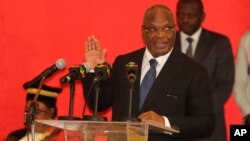More than 20 heads of state including French President Francois Hollande gathered in Bamako Thursday for the inauguration of Mali's new president, Ibrahim Boubacar Keita.
Keita addressed a stadium with more than 40,000 Malians in attendance, including representatives of the MNLA, the Tuareg separatist group whose rebellion touched off a coup in Bamako and the Islamist militant takeover of the north last year.
Keita pledged to be the president of all Malians, and also thanked the international community for its help in restoring order to the war-torn West African country.
French forces led the offensive that ousted al-Qaida-linked militant groups from power in the north earlier this year.
Keita was elected president last month, defeating his rival in a run-off vote. He took the oath of office September 4, but his formal inauguration was delayed until Thursday.
He faces numerous challenges, such as rebuilding the shattered army and forging peace with the northern Tuaregs who have been pushing for more autonomy for decades.
Also, hundreds of thousands of Malians remain displaced from the violence of the last 20 months, with many more still living as refugees in neighboring countries.
Keita addressed a stadium with more than 40,000 Malians in attendance, including representatives of the MNLA, the Tuareg separatist group whose rebellion touched off a coup in Bamako and the Islamist militant takeover of the north last year.
Keita pledged to be the president of all Malians, and also thanked the international community for its help in restoring order to the war-torn West African country.
French forces led the offensive that ousted al-Qaida-linked militant groups from power in the north earlier this year.
Keita was elected president last month, defeating his rival in a run-off vote. He took the oath of office September 4, but his formal inauguration was delayed until Thursday.
He faces numerous challenges, such as rebuilding the shattered army and forging peace with the northern Tuaregs who have been pushing for more autonomy for decades.
Also, hundreds of thousands of Malians remain displaced from the violence of the last 20 months, with many more still living as refugees in neighboring countries.





